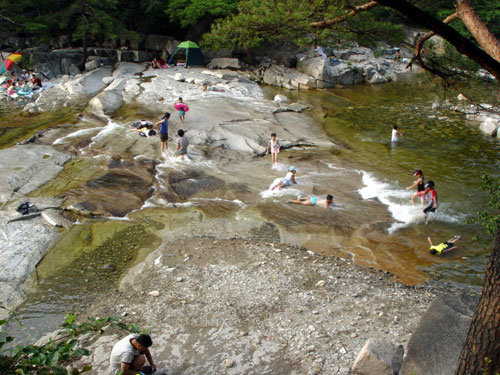Leaving Fatigue Behind on Weekend Getaways
Leaving Fatigue Behind on Weekend Getaways
Posted July. 11, 2005 03:20,

Its Friday night, and the freeway is jammed with cars escaping from the city. The airports are also all packed. These are people that have bet all the weekend on travel packages from traveling websites. Although it is crowded and jammed, their expressions full of expectations of escaping from daily routine are pleasant to watch. However, what will be on their faces in Monday morning?
Leave Time for Starting and Coming back, for a Relaxing Trip
Wherever the destination is, two days does not feel sufficient for traveling. Therefore, in order to buy some time, many people start off driving late Friday night. Nevertheless, such a packed weekend traveling schedule will be more burdensome on the body and mind than the workplace stress of the weekday.
Doctors advise, A weekend trip sleeping two days outside of home might leave a long lasting aftermath. Lets daringly give up hasty ambitions. If you have set up weekend trip, it is better to come back home early on Friday night, have a good nights sleep, and leave early Saturday morning.
A crammed tourist schedule is inadequate for a weekend trip to get rid of the exhaustion accumulated during the week. Some empty space is needed for it to be a break. A mountain, valley, or beach that can be reached within three hours is appropriate for a weekend trip. Even if it is a one-day trip, if you take them too often, it will be a burden to your body, so limit them to once every month.
Sunday afternoon should be used as a buffer-time to recover from the weekend trip. If possible, you should spend it at home with your family, preparing for Monday. If you go on a two-day trip, plan to have Sundays lunch at home or somewhere near home.
It is also critical to loosen all the stiff muscles in your shoulder and neck before sleeping in order to prevent after effects. After taking 15-minute bath, lie down comfortably and softly rotate all your joints from the tips of your toes to your head. Keeping a rhythmical respiration rate, repeat a regimen of 10 seconds of stretching and 10 seconds of relaxing, and then sleep.
Smart Travel Is Lessening Fatigue on Road
Traveling fatigue usually builds up on the road rather than at the destination itself. If youre driving a long distance, you should take a break, getting out of the car once every hour. If a traffic jam is heavy, in spare moments repeat simple stretching exercises such as rotating your shoulders or tightening and loosening your grip on the steering wheel.
Maintaining a good driving posture is also important to relieve pressure from your back. Lift the back of your seat to 90 degrees and place your hips close to your back. The drivers seat should be adjusted, so when completely stepping on a pedal your knee is slightly bent.
During summer, the interior air of the car might be dry due to the air conditioning, so take sufficient fluids and prevent dehydration. Prepare a small cooler with drinks, fruits and water towels before leaving. In particular, diabetics should keep drinking small amounts of water on the road, even if not feeling thirsty.
If going to a weekend farm or pension, one should prepare for injuries caused by outdoor activities. Prepare emergency medicine, and if you are taking medicine regularly such as for heart disease, take an extra two-day dose.
(Written with the assistance of Severance Hospital Family Medicine Professor Kang Hee-cheol, Emergency Medicine Professor Park In-cheol, and Seoul Asan Medical Center Sports Health Medicine Professor Jin Young-soo.)
TK Sohn sohn@donga.com







